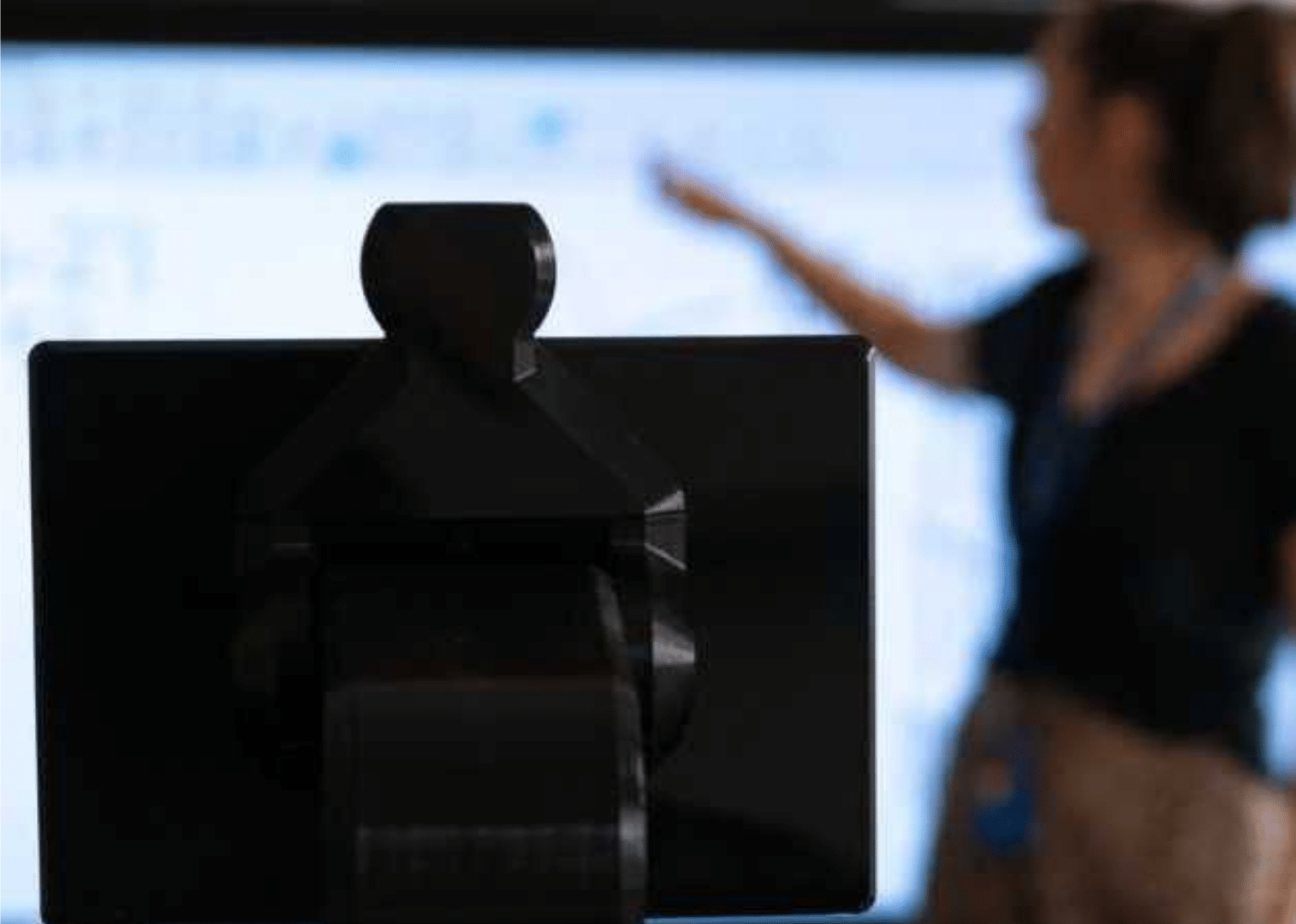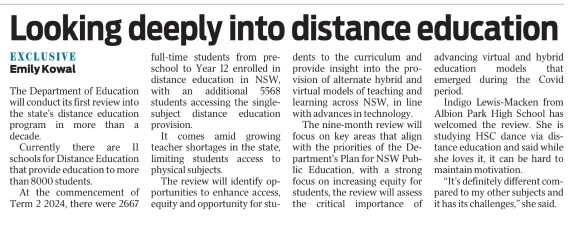17 June 2024: MissingSchool CEO Megan Gilmour – a Canberra-based social innovator, who launched the world’s first national school telepresence service, in 2017, to end chronic absence and isolation for kids left out by their medical or mental health challenges – cautiously welcomes the NSW Government’s review of “distance learning provision in NSW”.

According to an exclusive article in The Sunday Telegraph (“Looking deeply into distance education”, 16 June 2024), the NSW Department of Education is embarking on a nine-month review – in line with advances in technology – to gain insights into the provision of alternate hybrid and virtual models of teaching and learning to enhance equity and opportunity for students disadvantaged by physical limitations in accessing the curriculum. The review comes on the back of statewide school funding freezes and is said to be linked to teacher shortages.
“MissingSchool is encouraged by news that the NSW Department of Education, as part of its review, will consider advancing virtual and hybrid education models of teaching and learning, as adopted at scale during COVID lockdowns when schools moved classrooms online practically overnight,” says Gilmour.
“Distance education schools have their place, particularly in solving geographic isolation from school for students whose norm is continuous remote attendance. But caution is needed to ensure this doesn’t become the default, alongside leaving learning to chance, for 1 in 3 Australian kids facing complex attendance and medical-mental health challenges who want to stay in their own schools.
“As currently conceived, distance education schools are NOT typically designed for students who regularly transition between school and healthcare settings, including home and hospital, and fail to fulfil these students’ need for educational and social continuity with their schools of enrolment.”
Gilmour added the question begging is whether distance education schools are suitable for students who are already three times more likely to fall behind academically because they’re battling chronic conditions and absence. “There is simply no safe threshold when it comes to missing school. A child who misses just five days per school term—having less than 90% attendance—pays penalties in academic and mental health outcomes.
“Why can’t we shift the paradigm from ‘distance’ and ‘remote’ and follow workplaces – and even VET and university sectors – into the 21st century by adopting ‘learn from anywhere’ through assistive technology, giving students virtual ‘presence’ to learn and socialise alongside classmates when physical access is not possible.”
Reiterating concerns raised before a Senate Inquiry (The national trend of school refusal and related matters), Gilmour called for caution and common sense across state and federal levels to avoid inadvertently overlooking up to 1.2 million children who face chronic medical-mental conditions serious enough to impact long-term school attendance in the current narrowly framed “school refusal” narrative.
“When COVID lockdowns ended, and government directives brought students back into face-to-face classrooms, ‘old school’ expectations removed ‘learn from anywhere’ options for those still facing forced isolation in a personal health crisis,” she said.
“This missed the silver-lining opportunity to maintain schools’ transition to 21st-century models, ignoring a proven method–using assistive telepresence technology–to stem spiralling chronic school absence among an increasing number of students. I hope we’re not going to limit this transition to distance education schools.
“Today, it is unacceptable that potentially more than 200,000 NSW public school students, who briefly experienced a sense of belonging and normalcy during lockdowns (remotely connecting to their classrooms and participating alongside peers), are again being left behind during absence. Some are confronting emotional-based school avoidance, while others are fighting cancer. Some are being frowned upon, while others are forgotten.”
MissingSchool is on a mission to get “learn from anywhere” mainstreamed so that educational and social needs of a generation of students grappling with complex attendance and medical-mental challenges–and trauma–are equitably and effectively met through business as usual practices in schools, and so teachers can “teach once”.
Predating the pandemic by years, MissingSchool’s work in schools has helped an estimated 6,480 classmates across Australia reconnect through telepresence technology (from robots to web conferencing) – demonstrating effective, safe interventions to bridge school absence before it becomes chronic.
Gilmour praised public schools in NSW as the highest users of MissingSchool’s telepresence robot service in Australia.
“Since 2018, the NSW Department of Education has adopted the use of telepresence robots to connect students with disabilities and serious illness to their classrooms during absences and refers to these and other telepresence options on its website.
“MissingSchool welcomes more details on the review, including how it will be conducted and whether the NSW Department of Education will be consulting broadly and taking submissions. From an innovation perspective, schools are now in a pivotal ‘disruption’ phase that other industries have already faced, where the current model isn’t working for a large number of customers (students) and investors (teachers and parents). There is a first-of-its kind opportunity here for widespread transformation and assistive technology is key to much-needed, human-centred change.
“We hope the review includes a refresher on the application of the Disability Standards for Education (DSE) which covers all “illness” as a protected attribute. We’ve had a number of families come through our Helpline citing that their child has been turned away by the NSW Department of Education from its overflowing Distance Education waitlist (due to the current attendance crisis), because their child’s certified condition isn’t on the Department’s list of approved illnesses. These families are essentially being forced to home school.”
Building on the success of Australia’s first school telepresence robot service, MissingSchool is now rolling out a suite of digital services after completion of a one-year pilot made possible through a Commonwealth Emerging Priorities grant and seed funding from TPG Telecom Foundation. Aptly named Seen&Heard, the groundbreaking initiative is driving adoption of “teach once” telepresence technology (including robots) in schools and offering real-time assistance to students and their families, training teachers, fostering peer support, and producing world-leading research.
About MissingSchool CEO and Co-Founder Megan Gilmour
Social innovator and technology trailblazer, Megan Gilmour, co-founded MissingSchool in 2012 after watching her son, Darcy, struggle with a two-year period of school isolation due to a life-threatening illness, requiring a bone marrow transplant at the age of 10. Since then, Gilmour has led the not-for-profit, tirelessly advocating for the needs of students with complex medical and mental health conditions, their families, teachers and peers. Gilmour’s work has been recognised nationally and internationally. In 2018, she was a finalist for the ACT Australian of the Year Awards. She has also been recognised as one of AFR’s 100 Women of Influence, and was awarded the Telstra ACT Business Woman of the Year for Purpose and Social Enterprise in 2019. She is a Churchill Policy Fellow with studies on the topic in six countries, a Deakin University Honorary Fellow and 2020 Alumna of Year. Gilmour spearheads ongoing advocacy for a nationally consistent approach – including data and regulation visibility, and assistive technology – to address missing links in the policy chain for systemic support to students with complex attendance and health challenges. Something echoed in MissingSchool’s 2015 report, the follow-on Commonwealth-first report auditing state and territory action (driven by MissingSchool), and Gilmour’s Policy Paper (released through The University of Queensland’s Centre for Policy Futures and The Winston Churchill Trust). MissingSchool believes that all children should be seen and heard and “learn from anywhere” universally adopted. For more information, visit: www.missingschool.org.au

